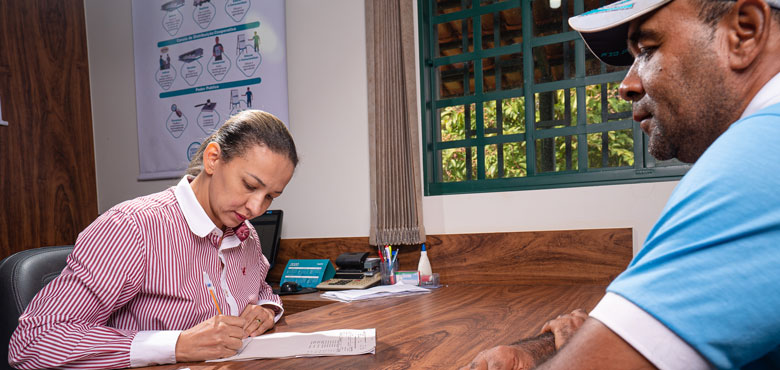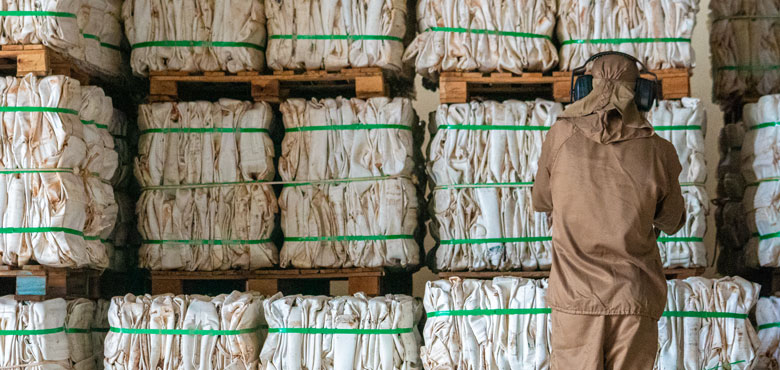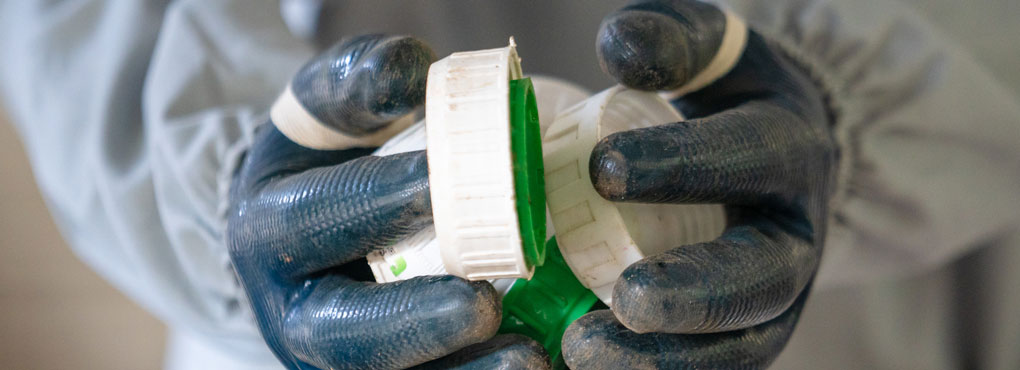The crop protection packaging lids also receive proper destination in the Campo Limpo System.
GRI 102-1, 102-2 and 102-7
A non-profit organization, inpEV (National Institute for Processing Empty Packages) represents the industry1 and, in 2019, had 112 crop protection manufacturers and registrants that act in Brazil. Its mission is to contribute towards conservation of the environment and the Campo Limpo System by means of self-sustainable management of the final disposal of empty packages of plant health products and by providing services in the solid waste area, with the involvement and integration of all links of the agricultural productive chain.
112 companies are associated to inpEV, responsible for managing the Campo Limpo System.
inpEV works to ensure the efficiency of the process, besides investing in research, development, awareness and environmental education. This integrated management vision also facilities capturing improvement opportunities of the System itself, such as the application of the circular economy concept for the production of new crop protection packaging from resin recycled from the received packaging or by expanding the System’s scope to receive post-consumption leftovers. Another example is the development of solutions to expand even more the universe of recyclable packaging materials. Currently, 94% of the entire received volume is recycled.
With its head office in São Paulo, the Institute also manages 29 of the 411 packaging receiving units across Brazil. The central stations under inpEV’s management are distributed across 11 states (Bahia, Espírito Santo, Goiás, Maranhão, Mato Grosso, Mato Grosso do Sul, Minas Gerais, Paraná, Piauí, Rio Grande do Sul and São Paulo). The Institute employs 185 professionals in total.
1 - Federal Law nr. 9.974/00 modified Law nr. 7.802/89 and defined the management principles and environmentally correct disposal of empty crop protection packaging. With its regulatory decree 4.074/02, the shared responsibility among all agents of agricultural production was defined: farmers, distribution channels and cooperatives, industry and the public power.
MISSION, VISION, AND VALUES GRI 102-16
MISSION
Contribute towards conservation of the environment and the Campo Limpo System by means of self-sustainable management of the final disposal of empty packages of plant health products and by providing services in the solid waste area, with the involvement and integration of all links of the agricultural productive chain.
VISION
Be acknowledged worldwide as a center of excellence in the final disposal of empty plant health packages, as a reference in providing services in the solid waste area and becoming selfsustainable in Brazil.
VALUES
Integrating attitude:
this is the leadership characteristic of the Institute, by valuing team work, integrating the links in the chain and disseminating knowledge.
Innovation:
it is our dynamics, entrepreneurship, creativity and ability to overcome challenges that position inpEV as a global reference in the reverse logistics of empty crop protection packaging.
Integrity:
this means behavior based on ethics, respect for differences, transparency in all actions performed and providing accurate information.
Social and environmental responsibility:
it is the raison d’être of the Institute, which acts as the intelligence center of the Campo Limpo System.
Safety:
it is the care for the well-being and physical integrity of our employees and all those involved in the Campo Limpo System, as well as the protection of information and assets.
COMMITMENT TO THE GLOBAL AGENDA
The contribution to conserve the environment, present in inpEV’s mission, is also materialized in the environmental awareness and educational initiatives for farmers and society at large, held throughout Brazil. The Institute understands that the capillarity of the Campo Limpo System, present in all states of the country with a total of more than 400 receiving units, is what allows it to enhance the benefits of its business.
In this way, by 2019, inpEV disseminated the Sustainable Development Goals (SDGS) among 240,600 junior high school students who participated in the Environmental Education Program (PEA). The initiative has been acknowledged by the United Nations Department of Economics and Social Affairs UN – DESA), as a good practice.
PEA HELPS DISSEMINATE THE SUSTAINABLE DEVELOPMENT GOALS
Supply chain GRI 102-9
The inpEV supply chain consisted of 1,275 suppliers in 2019. These include 41 direct suppliers, responsible for inputs and productive equipment and logistical services, transportation and final disposal, and 1,234 indirect suppliers, such as equipment and machinery companies, information technology and support to communication and engagement activities. Of the total procurement volume in the year, the most significant categories were transportation and logistical services (26.7% of the total).

A farmer returning the packaging at the Unaí (MG) receiving station.
Corporate governance GRI 102-18
inpEV’s administrative and management structure is in line with the best practices in the market and reflects the principles agreed upon in its by-laws: legality, impersonality, morality and equality. The Members General Assembly, the Board of Directors, the Board of Auditors and Executive Board are part of its governance. The importance of the Campo Limpo System, of which inpEV is the managing entity, is also reflected in its structure, with representatives from various decision-making bodies.
inpEV adopts the best governance and transparency practices.
The highest body of decision, the General Assembly integrates the Institute’s members, crop protection manufacturers and entities that represent the various links of the agricultural chain. Two annual assemblies are held each year to validate inpEV’s strategy and assess its performance.
The Board of Directors consists of five representatives from contributing associate companies (elected during the General Assembly), eight representatives of associated entities (other links of the agricultural chain) and by the Institute’s CEO. Its responsibility, among other attributions, is to ensure fulfillment of the by-laws and guarantee asset protection, based on commitment with the laws in effect and a close relationship among the links of the chain. The entities that represent the distribution channel and rural producers on the Board of Directors participate in the decisions and are responsible for replicating the information and deliberations within the Campo Limpo System.
inpEV’s Executive Board is responsible for the management and implementation of the Institute’s strategy and its results. It is chaired by the CEO, an independent hired professional (with no bond to the member companies), appointed by the Board of Directors.
Commitment towards transparency
The role of the Board of Auditors is to support and oversee the decisionmaking process of inpEV, which members are also elected during the General Assembly, with 1 year terms. In 2019 it was formed by representatives from the companies Sipcam, Arysta and Du Pont.
The Institute’s management model is structured based on rigid audit and control norms. Annually, inpEV reports the results of its activities and its financial performance according to the Brazilian accounting standards, under the guidance of external auditors and the opinion of the Board of Auditors.

Packages are pressed and organized on pallets at the receiving stations.
Support structure
Thematic groups that bring together inpEV specialists and professionals add knowledge and support decisions made by leadership:
Tax Committee: with the assistance of external consultants, this group facilitates compliance of participants of the Campo Limpo System regarding tax, fiscal and corporate issues.
Logistics Committee: discusses measures to improve reverse logistics processes and technologies under the scope of the Campo Limpo System.
Labor Committee: it debates issues relative to the inpEV professionals. The committee also supports the other receiving units of the Campo Limpo System.
National Central Stations Council: this cross-functional group is formed by managers of the receiving stations and its functions include general demands of the System and disseminating the best practices to the regional councils, acting to support inpEV’s administration.
Artifact Approval Committee Work Group (WG): assesses, controls and approves the manufacturing of artifacts using empty packages from the Campo Limpo System.
Packaging Committee WG: evaluates new trends, packaging lifecycle and sector innovations.
Board Of Directors – Companies
Basf S.A.
Paulo Celso Mathias
Maurício do Carmo Fernandes
FMC
Marcelo Okamura
Zotico Silva
Dow AgroSciences Industrial Ltda.
Adriano Pescarmona
Felipe Bissoli
Ilhabras S.A. Indústrias Químicas
Gustavo Urdan
Juliano Justo
Syngenta Proteção e Cultivos Ltda.
Jorge Buzzetto
José Pelaquim
Board of Directors – Entities
›› Abag (Associação Brasileira do Agronegócio)
›› Aenda (Associação Brasileira dos Defensivos Genéricos)
›› Andav (Associação Nacional dos Distribuidores de Insumos Agrícolas e Veterinários)
›› Andef (Associação Nacional de Defesa Vegetal)
›› Aprosoja (Associação Brasileira dos Produtores de Soja)
›› CNA (Confederação Nacional da Agricultura e Pecuária do Brasil)
›› OCB (Organização das Cooperativas Brasileiras)
›› Sindiveg (Sindicato Nacional da Indústria de Produtos para Defesa Vegetal)
Board of Auditors
Sipcam
Luiz José Fraga Moreira Traldi
Adilson da Cruz
Arysta
Yuji Hamada
Monica Vergé Fanucchi
Du Pont
Gustavo Queiroz Haddad
Manoel Canutto dos Santos Jr.
CODE OF CONDUCT GRI 102-16 and 205-2
The inpEV principles, values and mission are set forth in the Code of Conduct, which defines the expected attitude of employees concerning different stakeholders.
This material was revised in 2017 and deals with topics such as conflict of interest, respect towards differences, information security, relationship with the public sector and emphasizes inpEV’s and its employees’ commitment towards social-environmental accountability. The code also defines principles focusing on disseminating knowledge and sponsoring cooperation among all links of the agricultural chain that comprise the Campo Limpo System. The code also discloses the Anti-corruption and Fair Trade policies.
All employees and third-party professionals are informed of the Code of Conduct during the orientation process, which also includes the topic of the fight against corruption. In 2019, 100% of new hires underwent this process. There are also periodic training sessions on the topic and the next one is scheduled to take place in 2020.
The inpEV Code of Conduct is public and can be accessed at the Institute’s website: www.inpev.org.br.
